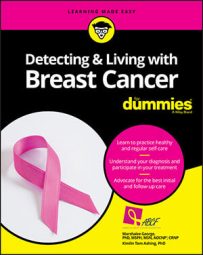- A poorly fitting bra: You should get refitted for a bra when you gain or lose weight. If your breast jiggles or moves while you are walking, your bra is not fitting well. When your breast isn't supported well in a bra, the weight of the breast is being supported by your chest wall muscles and connective tissue, which causes trauma and pain to those structures.
- Breast lump or mass: Any structure that presses against nerves in your breast can send a message to your brain that it interprets as pain. A breast cyst is a lump filled with fluid, and a breast mass is a lump filled with solid material. Both cysts and masses can cause breast pain. Breast pain caused by a cyst often occurs from hormonal changes before and during menstruation. A breast mass will usually cause breast pain when it has increased in size. Taking an over-the-counter non-steroidal anti-inflammatory drug (NSAIDS) such as aspirin, ibuprofen, or naproxen at least 24 hours prior to menstruation can significantly reduce breast pain caused by a cyst. Remember to first ask your doctor if NSAIDS are okay for you to take. Some people can't take NSAIDS due to their medical history and may have to be prescribed an alternative drug.
- Breast surgery: Any time you cut the skin by accident or intentionally from a surgery, there will be pain. The most intense pain from surgery is usually felt within the first two weeks, and the pain should gradually reduce over the next four weeks. Sharp, shooting, electric shock-like sensations or pain felt in the breast after surgery is normal. This sharp pain usually occurs because the nerves got irritated and inflamed when they were disrupted during surgery. As the nerves heal, the pain will be reduced and become less frequent. This may last six to nine weeks after surgery and is normal.
- Tight clothing: Tight clothing especially under the arm and across the chest when worn for several hours can cause breast pain. The best treatment for breast pain caused by tight clothing is to wear your size. Don't try to fit into small clothing because it can reduce circulation and cause injury to your skin in addition to pain.
- Trauma to the breast: If you play sports or fall face down, you may bruise the breast and may develop a hematoma (collection of blood in the breast tissue) from the injury. A hematoma can take at least two weeks to heal or longer if you're taking medications to thin the blood, such as aspirin or Warfarin.

